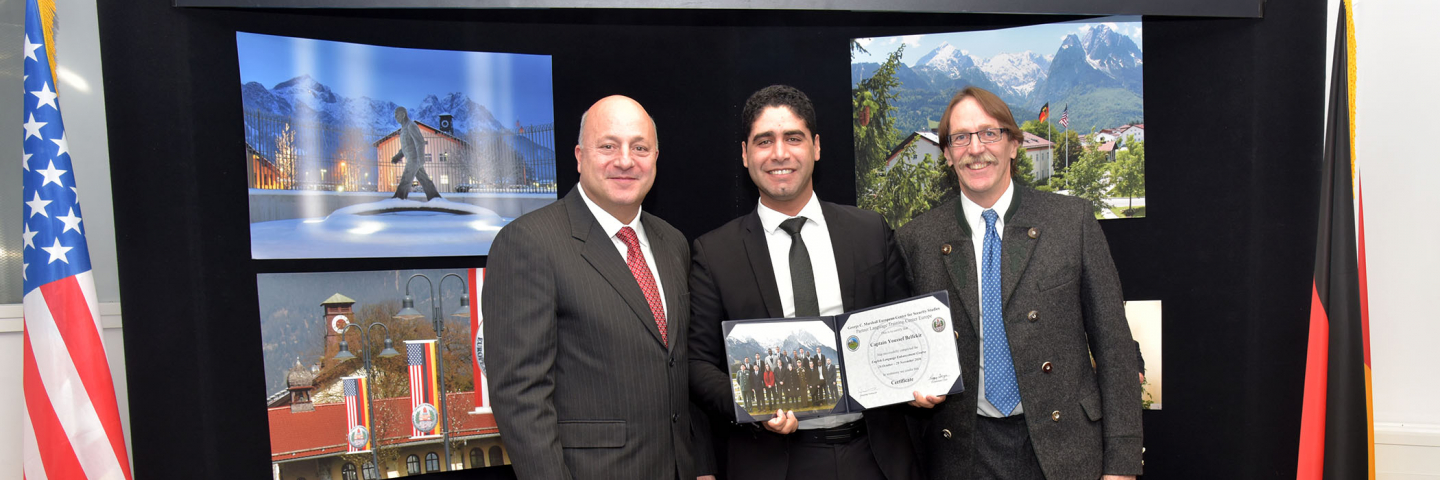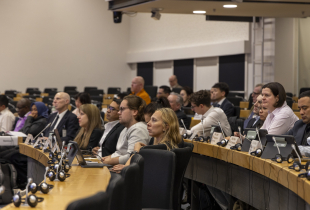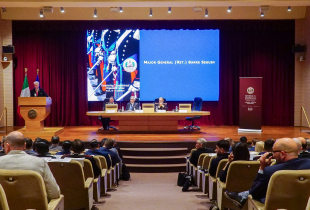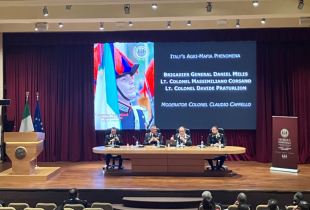
Making Friends, Combating Organized Crime Thanks to the English Language
By Christine June
Public Affairs Office
George C. Marshall European Center for Security Studies
GARMISCH-PARTENKIRCHEN, Germany (Nov. 29, 2016) – Moroccan Royal Gendarmerie Capt. Youssef Belfekir saw some of his classmates talking outside the dormitories when he first arrived at the George C. Marshall European Center for Security Studies to attend the English Language Enhancement Course (ELEC).
“When I went back to my room, I thought ‘what am I doing here; I can’t speak English; I can’t understand them,’ but after a few days, I was able to talk to my friends in English, and I was able to understand them,” said Belfekir, who is a company commander with the Caserne Gendarmerie Royale in Morocco.
Belfekir and his 15 classmates attended a five-week intensive English enhancement course to prepare them for the Marshall Center’s two-week Program on Countering Transnational Organized Crime (CTOC), which examines the major methods used by transnational criminal and terrorist organizations.
Sixteen participants from 12 countries graduated from this ELEC Nov. 29, and began the CTOC resident course the next day.
What was stopping Belfekir from talking with his classmates wasn’t that he didn’t know English, as it is a prerequisite for ELEC. It was that he wasn’t comfortable communicating in English, and that’s where ELEC can help, said Peggy Garza, chair of the English Language Program Department at the Marshall Center’s Partner Language Training Center Europe (PLTCE). She oversees the ELEC courses.
She said that ELEC instructors provide an atmosphere where the participants are at ease and able to practice and improve their English communication skills.
“It (ELEC) made me more confident about listening to and speaking in English,” Belfekir said. “I can now organize my ideas and speak them smoothly in English.”
The instructors tailored the curriculum and vocabulary needed by security professionals who fight organized crime, focusing on presentation skills, public speaking practice and discussion strategies. This course is designed to improve their English language skills, especially their ability to communicate at a professional level on security topics, Garza said.
“For me, ELEC was the first time I heard TOC (transnational organized crime) terms in English. Never in my life, have I heard these terms (in English),” said Peruvian Army Col. Manuel Gustavo Luque Obando. “This course was very good in improving my knowledge about TOC terms and helped me to be ready to attend the CTOC program.”
Words like “narcotics,” “illicit,” or “trafficking” are used daily and need to be immediately understood during CTOC.
Through reading materials, presentations by CTOC faculty, classroom discussions and videos, participants became familiar with the terminology and subject matter used in CTOC while improving their understanding of the nature of other security threats affecting the global community, Garza said.
“I learned – in a very short time – how to express myself when speaking English,” said Dr. Ellie Sonbang, division chief for the Research and Documentation at the International School for Security Forces with the Ministry of Interior in Cameroon. “This is important because I need to be able to talk (in English) to my minister about a current issue or problem.”
“The interesting thing is that first you are just talking about basic information like ‘what’s your name,’ ‘where are you from,’ but now we are talking about politics,” said Belfekir. “It means our English has improved very well.”
During the graduation ceremony, Professor Joseph Vann, the CTOC director, stressed, “English is one of the true global languages. Continue to work on your English proficiency because it increases your ability to network. You will hear ‘it takes a network to defeat a network” in CTOC. Whether it is a network to defeat a terrorist network or a network to defeat a network of transnational criminals, your ability to speak to one another in English as a network will be very, very important.”
Networking and making friends by being able to communicate in English was the most beneficial aspect of ELEC for Commissioner Zydrunas Velicka, chief specialist and liaison office with the Kaunas County Police Headquarters in Lithuania. “I met people from four different continents, and I had the ability to talk with them because ELEC helped me to improve my English.”
“It’s a friendship to the English language,” said Capt. Tuvshinbat Lkhagvasuren, senior detective with the Criminal Police Department of the Ministry of Justice and Home Affairs in Mongolia. “Because you make friends from all over the world when you are able to communicate in English.
“The great thing is that we now know each other, our cultures and our countries,” Lkhagvasuren said. “I didn’t care about other countries before I came here. For example, I watched a news story on T.V. last week about Colombia. Before, I would not have watched it, but I watched this news because my friend is from Columbia. This story is very interesting for me because I now have a friend from Columbia.”
Lkhagvasuren is referring to his ELEC classmate Columbian Maj. Wendell Porras.
“It is not just an English course,” Lkhagvasuren said. “It is also provides knowledge about other countries and approaches.”


